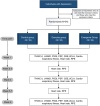Exergames improves cognitive functions in adolescents with depression: study protocol of a prospective, assessor-blind, randomized controlled trial
- PMID: 37442973
- PMCID: PMC10339627
- DOI: 10.1186/s12888-023-04967-7
Exergames improves cognitive functions in adolescents with depression: study protocol of a prospective, assessor-blind, randomized controlled trial
Abstract
Background: Depression is a condition that imposes a significant disease burden, with cognitive impairment being one of its costly symptoms. While cognitive rehabilitation is crucial, it is also challenging. Although some studies have investigated the impact of exergames on cognitive function improvement, these have primarily focused on the elderly population, with limited attention given to individuals with depression. Consequently, this study aims to investigate the effects of exergames on cognitive functions in adolescents with depression and compare the effectiveness of exergames with traditional exercise.
Method: The present investigation is a single-center randomized controlled trial that employs the ANOVA method to calculate the sample size using G*Power software, assuming a 25% dropout rate. The study enrolls fifty-four eligible patients with depression who are randomly allocated to one of three treatment groups: the exergames group, which receives standard treatment and exergames intervention; the exercise group, which receives standard treatment and traditional exercise intervention; and the control group, which receives standard treatment exclusively. The study provides a comprehensive regimen of 22 supervised exercise and exergame sessions over an 8-week period, with a frequency of twice per week for the initial two weeks and three times per week for the subsequent six weeks. The researchers gather cognitive, mood, and sleep metrics at the onset of the first week, as well as at the conclusion of the fourth and eighth weeks. The researchers employ a wearable device to track participants' heart rate during each intervention session and evaluate the Borg Rating of Perceived Exertion scale at the conclusion of each session.
Discussion: The findings from this study make several contributions to the current literature. First, this study comprehensively reports the efficacy of an exergames intervention for multidimensional symptoms in adolescents with depression. Second, this study also compares the efficacy of exergames with that of traditional exercise. These findings provide a theoretical basis for the use of exergames as an adjunctive intervention for depression and lay the groundwork for future research.
Trial registration: This trial is registered with the Chinese Clinical Trials Registry (Registration number: ChiCTR2100052709; Registration Status: Prospective registration;) 3/11/2021, URL: http://www.chictr.org.cn/edit.aspx?pid=135663&htm=4 .
Keywords: Adolescents; Clinical trial protocol; Cognitive functions; Depression; Exercise; Exergames; Randomized clinical trial.
© 2023. The Author(s).
Conflict of interest statement
The authors have no potential conflicts of interest to disclose. There are no conflicts of interest between the authors and the funder.
Figures


References
Publication types
MeSH terms
Associated data
LinkOut - more resources
Full Text Sources
Medical

